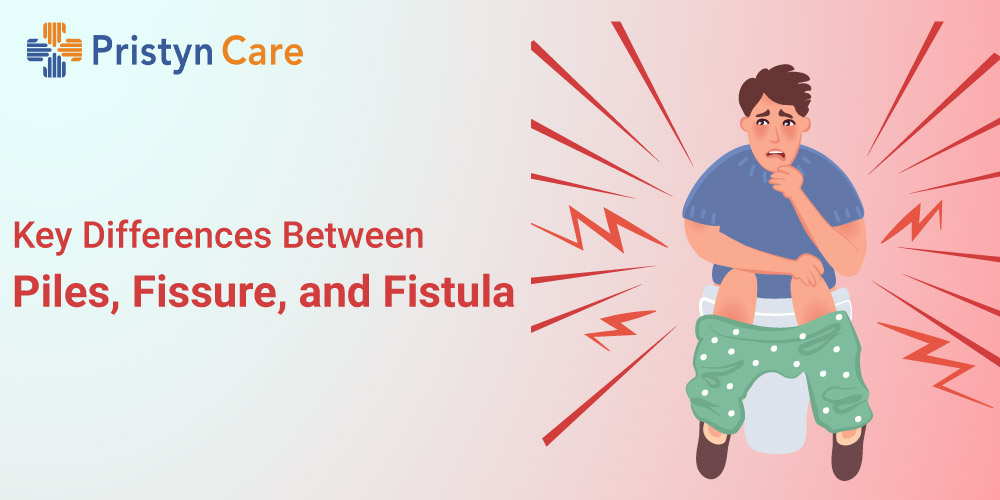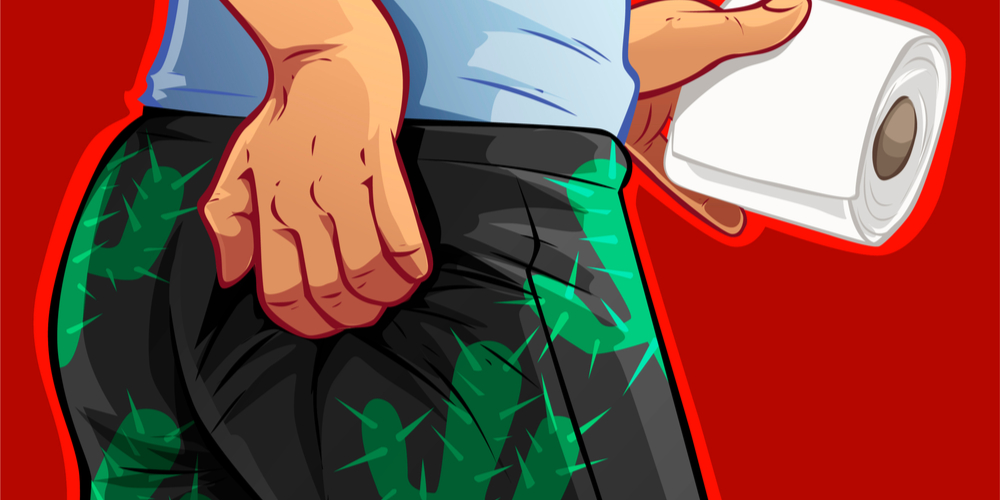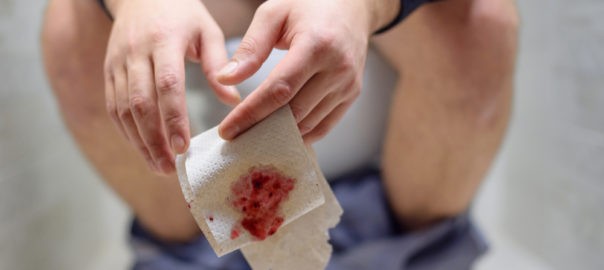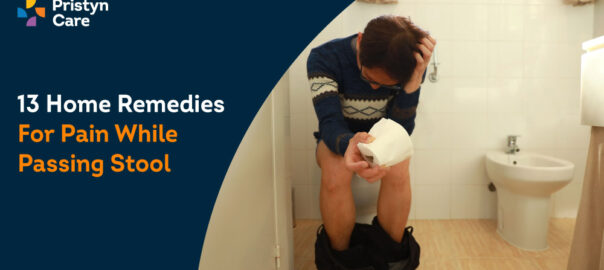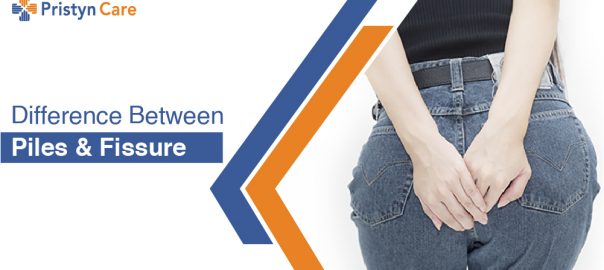![]() Views: 12,752
Views: 12,752
Key Differences Between Piles, Anal Fissures, and Anal Fistulas
Piles, fissure, and fistula are anorectal diseases. Anorectal diseases affect the rectum and the anal canal of the body. Piles, fissure, and fistula are although common diseases but still, not many people can differentiate between them.
Dedicated Support at Every Step!
Our Doctors are available 24 hours a day, 7 days a week to help you!
Usually, people are unable to identify the actual disease that causes them discomfort in the anal region. It is because the symptoms of these three conditions are similar.
Table of Contents
Major Differences Between Piles, Anal Fissures, and Anal Fistulas
| Comparison | Piles | Anal Fissures | Anal Fistulas |
| Defining the disease | It is the condition of the inflammation of veins and tissues of the anal region | A small cut or tear in the lining of the anus that causes bleeding and swelling of the anus is called anal fissure. | In fistula, an abnormal channel forms between the anal canal and the skin near the anus. It causes bleeding along with the discharge of the pus. |
| Symptoms | Bloodstained stools, strainful and painful bowel movements, lump formation near the anus, A purulent discharge because of the pus, itching around the anus, redness, and soreness of the skin of the anus. | A cut or tear that is visible in the skin of the anus, Intense pain during bowel movements, Bloodstains on stools, Burning sensation around the anus, Feeling of full bowel even after passing stools many times | Pain and swelling in the anal region, Painful bowel movements, foul-smelling discharge oozing out of the opening of the anus, Irritation and soreness of the skin around the anus, Bleeding while passing stools, Fever and chills in severe cases |
| Causes | Chronic constipation, recurring diarrhea, inactive lifestyle and excess body weight, strainful bowel movements | Passing large and hard stools due to constipation can cause a tear in the anal skin, Chronic diarrhea, Anal cancer, rough anal intercourse, inflammatory bowel disease, sexually transmitted infection such as HIV AIDS, syphilis, etc. | Inflammatory bowel disease (Crohn’s disease), Cancer treatment (radiation therapy), sexually transmitted infections, |
| Preventive measures | Have foods that are rich in dietary fibers, Drink a lot of water and healthy fluids, Maintain an active lifestyle and avoid sitting for long hours | Fiber-rich diet, Keep yourself hydrated and drink healthy fresh juices, Minimize the intake of caffeinated and carbonated drinks that can cause dehydration | All the preventive measures for piles and fistula work effectively for fistula as well. |
These are the key differences between Piles, fissure, and fistula. Let’s know more about these conditions and their effective treatments.
No Cost EMI, Hassle-free Insurance Approval
Piles/Hemorrhoids
Apart from the above-mentioned causes, eating fried and spicy food can contribute to Piles. Having much spicy and fried food causes difficulty in passing stools. Due to the extra straining, pressure on the veins and the tissues of the anal region increases. This excess pressure results in the inflammation of those veins and tissue.
The swollen blood vessels cause excruciating pain and discomfort which makes it difficult for a person to even sit. Hemorrhoids or piles can be internal or external depending upon the inflamed veins and tissues.
Piles are classified into four grades that depend upon the severity of the condition.
- Grade 1 Piles- At this stage, there is no visible symptom of Piles. There are only internal swelling in the lining of the anal canal.
- Grade 2 Piles- This is called the prolapsed stage of Piles. At this stage, the physical symptoms of Piles start appearing. The hemorrhoids become larger than grade 1 and may come out of the anus during bowel movements. Grade 2 piles return inside the anus after passing the stools.
- Grade 3 Piles- This stage of piles is extremely painful for the person. Piles get pushed out of the anus while passing stools. These hemorrhoids do not go back on their own. You have to push them back inside the anus by fingers.
- Grade 4 Piles- This is the most complicated stage of piles. Such hemorrhoids remain outside the anus even if you try to push them back manually. It is almost impossible for the patient to be able to sit comfortably. It is an emergency situation that requires immediate medical attention.
Anal Fissure
Anal fissure needs proper medical treatment as soon as the symptoms start arising. You might have to face unwanted complications if you leave it untreated. The tear or cut in the lining of the anus can get severe with every bowel movement over a period of time. Therefore, if you do not take any treatment for anal fissure, it can result in a severe case. And, a severe and prolonged condition of an anal fissure is called a chronic fissure.
Once, the chronic fissure develops, there are high chances of its recurrence in a person. So, just make sure that you do not delay in seeking medical help for anal fissure.
Fistula
Medical treatment for a fistula is mandatory. Also, one has to be really careful in choosing the right treatment for fistula. If you do not receive a proper surgery, there are high chances of infections or recurrence of fistula. Improper treatment of fistula may even lead to bowel incontinence.
So, now we can clearly see that all these three medical conditions require medical treatment. There are numerous treatment options and medications available for piles, fissure, and fistula. Even home remedies can help in providing symptomatic relief, but not as a permanent solution. The most advanced and effective treatment is a laser-assisted procedure. Let’s know more about the laser treatment for piles, fissure, and fistula
Laser Treatment for Piles, Fissure, and Fistula
The modern laser-based treatment is the most effective for the treatment of piles, fissure, and fistula. The entire procedure takes only 30 minutes to complete. Laser treatment is the best permanent solution to get rid of piles, fissure or fistula.
The laser treatment is minimally invasive procedure. Therefore, the patient recovers faster as compared to open surgery. Open surgery for piles, fissure or fistula is very complex and painful too. It takes long days of recovery and there are high chances of infections after open surgery. (Also Read: Difference Between Open And Laser Surgery For Piles)
Therefore, to avoid complications of open surgery, laser-assisted treatment is the best option. It is a daycare procedure that allows the patient to go back home on the same day of the procedure. Also, the success rate of laser treatment is quite high and the complication rate is nil.
Tips to remember
There are a few tips that can help you in dealing with piles, fissure or fistula. The tips are simple yet effective.
- Use ice packs or cold compresses to relieve the swelling around the anus. Do it for 10-15 minutes every day. It will significantly reduce the swelling and burning sensation.
- Wear only loose and comfortable cotton clothes that are clean and dry. In case of leakage of discharge or blood, regularly change your clothes. It will keep you safe from infections.
- Take a shallow bath (sitz bath) in warm water. You have to sit in such a way that only your hips dip in the warm water. Sitz bath is quite effective in soothing out the pain and swelling in the anal area. It also keeps the anus clean and free of infectious bacteria. Take a sitz bath regularly and only gently wipe anal region. Do not use a rough cloth to wipe as it may aggravate the condition.
- Avoid using scented toilet wipes. The chemicals present in such scented wipes can make your condition of piles, fissure or fistula even worse.
- Do not go for self-medication. Always consult a doctor before taking any medicine
Take Away
You must consult a specialist doctor as soon as the symptoms of any of these conditions show up. Receiving proper and timely treatment can save you from a lot of troubles. Discuss your condition with the doctor without any hesitation. This way, you will receive the right treatment. Follow the instructions that your doctor gives after the surgery and go for regular follow-ups. All these things will make your life better and free from the troubles of piles, fissure or fistula.



